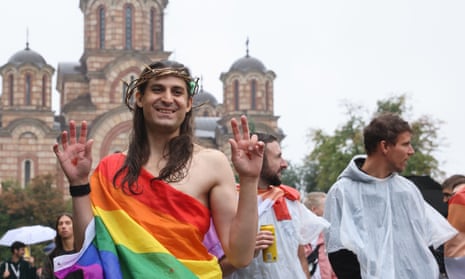Thousands of LGBTQI+ activists turned out for Belgrade’s EuroPride march on Saturday, despite an earlier government ban, as Serbian police clashed with counter-demonstrators, with more than 64 arrested.
The event had been intended as the cornerstone event of the EuroPride gathering. But the interior ministry banned the march earlier this week, citing security concerns after rightwing groups threatened to hold protests.
Although the march took place in central Belgrade without serious incident, local media said clashes broke out in another part of the city between counter-demonstrators and police. Associated Press reported stun grenades, stones and flares being thrown at police, who repelled the attacks with batons and riot shields. N1 television reported that several vehicles were damaged.
The authorities gave no details on those detained, but AFP journalists saw several counter-demonstrators being taken away.
The Balkan country’s prime minister, Ana Brnabić – who is openly gay – said 64 people were arrested and 10 police officers injured on Saturday, but underlined that she was “proud” that the day ended with “no major incidents”.
British model and activist Yasmin Benoit said she had been to many gay pride parades, “but this one is slightly more stressful”. “I’m from the UK, where everyone is more supportive and it’s more commercial,” she told AFP. “But here, this is really what Pride should be,” she added, referring to the societal struggle at the origins of the movement.
“We are fighting for the future of this country,” said Luka, a Serbian taking part in Saturday’s event.
The interior ministry had also barred any counter-protests, but some far-right groups vowed to rally in front of churches.
Serbia’s interior minister, Aleksandar Vulin, had warned in a statement that “we will not tolerate any violence in Belgrade streets, any more than illegal marches”.
Organisers said they received eleventh-hour guarantees from Brnabić that the march, scheduled for 5pm, could take place on Saturday morning. Participants were able to march in the rain a few hundred metres between the constitutional court to a nearby park before heading to a music event, a much shorter route than organisers had originally planned.
Vulin insisted on Saturday that the ban had been enforced, and that people had merely been “escorted to a concert”.
Gay marriage is not legally recognised in Serbia, where homophobia remains deep-seated despite some progress over the years in reducing discrimination.
The Balkan country, a candidate for EU membership, had been under intense international pressure to allow the march. More than 20 embassies – including the US, France and Britain – had issued a joint statement urging the authorities to lift the ban.
There was a heavy police presence around the Pride rally, with officers pushing back small groups of counter-demonstrators waving crosses and religious insignia. Brnabic said 5,200 police officers were deployed on Belgrade’s streets during the march.
The US embassy had urged its citizens to avoid the event “because of the potential for unruly crowds, violence, as well as possible fines”.
Human rights groups and the EU had called on the Serbian government to rescind the ban.
“The Serbian government’s decision to cancel EuroPride is a shameful surrender to, and implicit sanctioning of, bigotry and threats of unlawful violence,” said Graeme Reid, director of the LGBT rights programme at Human Rights Watch.
At least 15 members of the European parliament announced that they would join the Pride march in a show of solidarity.
Belgrade Pride marches in 2001 and again in 2010 were marred by violence and rioting after far-right groups targeted the event. Since 2014, the parade has been organised regularly without any notable unrest, but with a large law enforcement presence.
This year’s ban came just days after thousands took part in an anti-Pride demonstration in Belgrade, with biker gangs, Orthodox priests and far-right nationalists demanding that the EuroPride rally be scrapped.
